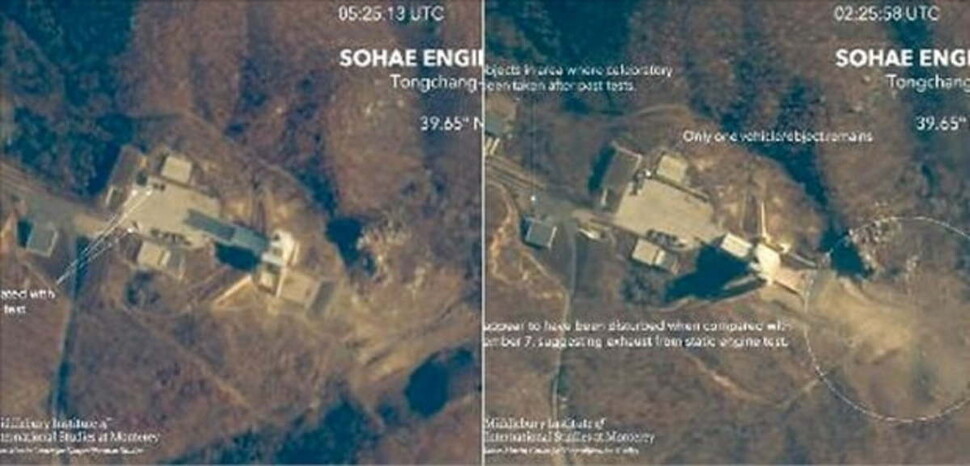hankyoreh
Links to other country sites 다른 나라 사이트 링크
N. Korea’s Sohae test was of a high-output engine using liquid fuel, S. Korean military says

The South Korean military believes that the subject of the “very important test” carried out by North Korea at its Sohae Satellite Launching Ground on Dec. 7 was a high-output engine using liquid fuel, the Hankyoreh learned on Dec. 9. The military has reserved its judgment on the question of whether this test will lead to a satellite launch or an intercontinental ballistic missile (ICBM) launch.
“The launch pad at Tongchang Village isn’t a facility capable of conducting solid fuel tests. The view of intelligence officials is that this test wasn’t related to solid fuel,” said a senior official in the South Korean military on Monday. The officials’ remarks suggest that the test may have been held at the vertical launcher at Tongchang Village, which is designed to test liquid fuel engines.
The view in some quarters is that North Korea’s test was designed to increase the engine output of the Hwasong-15 ICBM, which was tested in November 2017. During that test, North Korea unveiled what it called the “Mt. Paektu engine,” which combined two of the Hwasong-14 engines. The Mt. Paektu liquid fuel engine is based on the RD-250 twin engine developed by the Soviets. North Korea currently uses liquid fuel engines in its satellite launch vehicles and its ICBMs.
The US continues to bolster efforts to monitor movements in North Korea. The Rivet Joint RC-135W, the US’ primary plane for frequency monitoring and surveillance, flew at an elevation of 9.4km above southern Gyeonggi Province on Monday.
By Yoo Kang-moon, senior staff writer
Please direct comments or questions to [english@hani.co.kr]

Editorial・opinion
![[Editorial] Yoon must halt procurement of SM-3 interceptor missiles [Editorial] Yoon must halt procurement of SM-3 interceptor missiles](https://flexible.img.hani.co.kr/flexible/normal/500/300/imgdb/child/2024/0501/17145495551605_1717145495195344.jpg) [Editorial] Yoon must halt procurement of SM-3 interceptor missiles
[Editorial] Yoon must halt procurement of SM-3 interceptor missiles![[Guest essay] Maybe Korea’s rapid population decline is an opportunity, not a crisis [Guest essay] Maybe Korea’s rapid population decline is an opportunity, not a crisis](https://flexible.img.hani.co.kr/flexible/normal/500/300/imgdb/original/2024/0430/9417144634983596.jpg) [Guest essay] Maybe Korea’s rapid population decline is an opportunity, not a crisis
[Guest essay] Maybe Korea’s rapid population decline is an opportunity, not a crisis- [Column] Can Yoon steer diplomacy with Russia, China back on track?
- [Column] Season 2 of special prosecutor probe may be coming to Korea soon
- [Column] Park Geun-hye déjà vu in Yoon Suk-yeol
- [Editorial] New weight of N. Korea’s nuclear threats makes dialogue all the more urgent
- [Guest essay] The real reason Korea’s new right wants to dub Rhee a founding father
- [Column] ‘Choson’: Is it time we start referring to N. Korea in its own terms?
- [Editorial] Japan’s rewriting of history with Korea has gone too far
- [Column] The president’s questionable capacity for dialogue
Most viewed articles
- 1Months and months of overdue wages are pushing migrant workers in Korea into debt
- 2[Editorial] Yoon must halt procurement of SM-3 interceptor missiles
- 3Trump asks why US would defend Korea, hints at hiking Seoul’s defense cost burden
- 4[Guest essay] Maybe Korea’s rapid population decline is an opportunity, not a crisis
- 5At heart of West’s handwringing over Chinese ‘overcapacity,’ a battle to lead key future industries
- 61 in 3 S. Korean security experts support nuclear armament, CSIS finds
- 7Fruitless Yoon-Lee summit inflames partisan tensions in Korea
- 8First meeting between Yoon, Lee in 2 years ends without compromise or agreement
- 9[Column] Park Geun-hye déjà vu in Yoon Suk-yeol
- 10South Korea officially an aged society just 17 years after becoming aging society